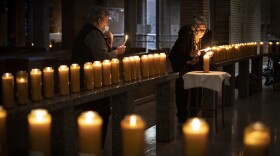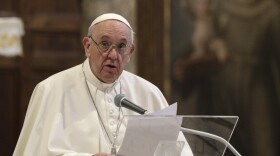
Tom Gjelten
Tom Gjelten reports on religion, faith, and belief for NPR News, a beat that encompasses such areas as the changing religious landscape in America, the formation of personal identity, the role of religion in politics, and conflict arising from religious differences. His reporting draws on his many years covering national and international news from posts in Washington and around the world.
In 1986, Gjelten became one of NPR's pioneer foreign correspondents, posted first in Latin America and then in Central Europe. Over the next decade, he covered social and political strife in Central and South America, the first Gulf War, the wars in the former Yugoslavia, and the transitions to democracy in Eastern Europe and the former Soviet Union.
His reporting from Sarajevo from 1992 to 1994 was the basis for his book Sarajevo Daily: A City and Its Newspaper Under Siege (HarperCollins), praised by the New York Times as "a chilling portrayal of a city's slow murder." He is also the author of Professionalism in War Reporting: A Correspondent's View (Carnegie Corporation) and a contributor to Crimes of War: What the Public Should Know (W. W. Norton).
After returning from his overseas assignments, Gjelten covered U.S. diplomacy and military affairs, first from the State Department and then from the Pentagon. He was reporting live from the Pentagon at the moment it was hit on September 11, 2001, and he was NPR's lead Pentagon reporter during the early war in Afghanistan and the invasion of Iraq. Gjelten has also reported extensively from Cuba in recent years. His 2008 book, Bacardi and the Long Fight for Cuba: The Biography of a Cause (Viking), is a unique history of modern Cuba, told through the life and times of the Bacardi rum family. The New York Times selected it as a "Notable Nonfiction Book," and the Washington Post, Kansas City Star, and San Francisco Chronicle all listed it among their "Best Books of 2008." His latest book, A Nation of Nations: A Great American Immigration Story (Simon & Schuster), published in 2015, recounts the impact on America of the 1965 Immigration Act, which officially opened the country's doors to immigrants of color. He has also contributed to The New York Times, The Wall Street Journal, The Washington Post, The Atlantic, and other outlets.
Since joining NPR in 1982 as labor and education reporter, Gjelten has won numerous awards for his work, including two Overseas Press Club Awards, a George Polk Award, and a Robert F. Kennedy Journalism Award. He is a member of the Council on Foreign Relations. A graduate of the University of Minnesota, he began his professional career as a public school teacher and freelance writer.
-
President Biden is only the second observant Catholic president in U.S. history. He also supports the right to an abortion, which has set him off on a rocky start with U.S. bishops.
-
Wednesday's post-inauguration prayer service, a tradition dating to George Washington's inauguration, featured faith leaders from various religious traditions. Many were from progressive backgrounds.
-
Some of the extremists who assaulted the U.S. Capitol are Christian nationalists. They believe they are on a divine mission to challenge government institutions in the name of God.
-
The Trump administration has issued a new rule this week that allows federal contractors that claim a religious mission to exclude any job applicant who does not share their beliefs.
-
Opposition to the death penalty is "a teaching that deserves our respect," says Oklahoma City Archbishop Paul Coakley. "I don't think it can be simply disregarded."
-
Francis Collins, head of the National Institutes of Health, told the Southern Baptist Convention's Ethics and Religious Liberty Commission that churches shouldn't return to in-person worship yet.
-
The president's campaign now realizes it was not white evangelicals who got Trump elected in 2016 but conservative Catholics.
-
"What we have to create is a civil union law. That way they are legally covered," the pope said in an interview in the film Francesco, which premiered Wednesday at the Rome Film Festival.
-
Amy Coney Barrett is a devout Catholic and member of a charismatic group. Her Supreme Court nomination raises questions of whether the faith of a justice can or should influence their jurisprudence.
-
Republican and Democratic conventions show that both parties are appealing to faith voters. They have mostly different target audiences, though Catholics are getting special attention this year.



